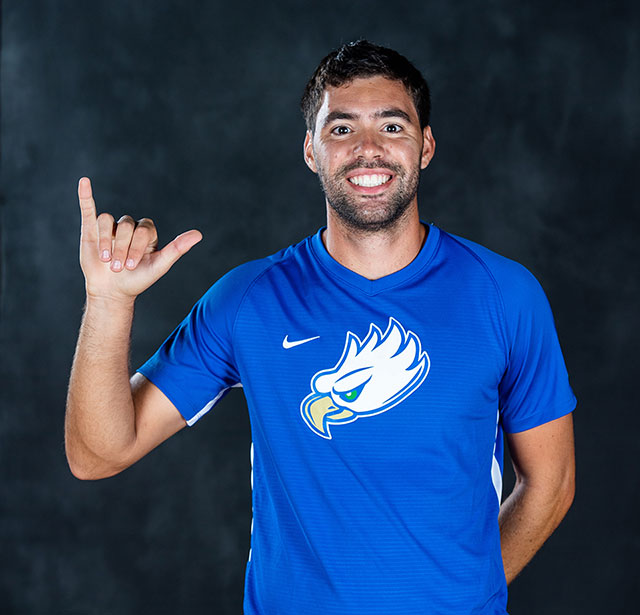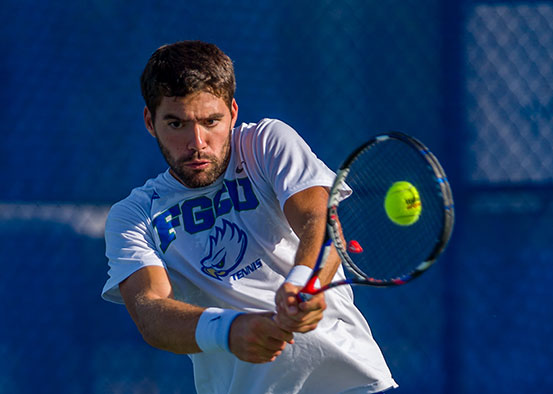When he embarked on a professional tennis career as a teenager almost a decade ago, Marcelo Tebet never anticipated fate would bring him to Florida Gulf Coast University.
Ironically, FGCU is where the tennis chapter of his life might end in a couple of years. But for Tebet, that isn’t failure. Despite the personal hardship that altered his initial plan of being a touring tennis pro, and would eventually bring him to FGCU, he will leave the university one day with a rich, diverse resume as an Eagle student-athlete turned assistant coach.

On the FGCU tennis side, despite a senior season cut short by the COVID-19 lockdown, Tebet will have – among numerous team and individual accolades earned under head men’s tennis coach C.J. Weber — a few seasons of coaching experience, an ASUN Conference Tournament MVP award as part of a team championship, and two prestigious Intercollegiate Tennis Association honors that recognize character and leadership.
On the student side, Tebet will leave FGCU with an ITA scholar-athlete award for his 3.67 GPA last academic year while earning a bachelor’s degree in interdisciplinary entrepreneurship studies, he’s pursuing an MBA here, and he plans to eventually start his own financial company.
In pro tennis terminology, you could call that impressive record a Grand Slam in higher education.
“I truly think we have one of the best tennis programs in the country,” said the 24-year-old Tebet, in his first season transitioning from player to coach. “We have played a tremendous level of tennis for the past two, three years, and all our hard work has been paying off. It is going to be an incredibly fun journey, and I am so excited to start it. Plus, after studying a lot and doing my research about FGCU’s MBA program, there’s literally no better place to be.”
But Tebet couldn’t have foreseen being in this “place” when growing up in Londrina, Parana, Brazil, as the son of a tennis professional. He got into the sport competitively at a young age, and his first visit to the United States in 2007 cemented what he thought would be his future. “I was 11 years old, and I came here to play some tournaments and go to Disney World,” Tebet recalled. “I had a blast, and because of that trip, I decided to play professional tennis.”
And play he did. A lot. As it turned out, too much for the body of a growing teenager who one day would be 6 feet, 2 inches tall.
In 2011, at age 15, Tebet turned pro. Just two years later, after the best season of a promising career that included qualifying for the U.S. Open, that career was all but over. Playing around the world in 22 different countries over just 28 weeks in 2013 took its toll, and the nonstop stress caused severe tendon damage in both of Tebet’s knees. “I couldn’t play for 2½ years,” he said.
No longer able to compete against the world’s best professionals, Tebet decided to attend college after getting a call from one of his good friends, fellow Brazilian Lucas Vaz, then FGCU assistant men’s tennis coach and a former Eagle player himself. “We used to play some junior tournaments together back in Europe in 2010,” Tebet said. “I decided to go to FGCU after his phone call. He explained to me how the program works, and how good of a team we had — and have. C.J. is also one of most amazing coaches I have ever met. So, it was a fairly easy decision for me.”
A decision that has proven mutually beneficial. Although he had competed as a professional, the NCAA granted Tebet a hardship waiver because of the injury that ended his pro career, and after joining FGCU in 2017, he would go on to win more than 60 combined matches in singles and doubles play before the pandemic suspended the 2020 season. The highlight of his three-year FGCU career came in 2019, when the Eagles won ASUN regular-season and tournament titles and made an NCAA Tournament appearance, thanks in large part to Tebet’s title-clinching, tournament MVP performance.

“That was a great year for the team,” Tebet said. “We started the season a little slow, but we managed to arrive into conference matches playing incredibly well. We didn’t lose a single match the entire conference season. I remember telling my team in the beginning of the year, ‘Boys, we are NOT going to lose this year. Look at your hand right now and pick the finger you want to put our ring on.’”
It was that type of vocal leadership on top of his court play and inspirational character that prompted Tebet’s coach, Weber, to nominate his Brazilian student-athlete for two prestigious ITA honors in 2020: the Southeast Regional Arthur Ashe Leadership & Sportsmanship Award and the Rafael Osuna Sportsmanship Award. Not surprisingly, Tebet won both.
A three-time ASUN Coach of the Year during his nine seasons leading the Eagles, Weber knows what Tebet has been through perhaps better than anyone at FGCU. In his letter to the Ashe award committee, Weber wrote passionately about “one of the most upstanding young men I’ve ever had the pleasure of coaching.”
After briefly detailing Tebet’s court accomplishments at FGCU, Weber got to the reasons his then-senior deserves the awards named after two talented, gracious men who were pioneers as an African-American (Ashe) and Mexican (Osuna) on the tennis circuit.
“I don’t even know where to begin with him, because he has been the absolute most perfect student-athlete during his career here at FGCU,” Weber wrote. “From a tennis perspective, he has overcome an incredible amount of adversity, as he had what would have been career-ending injuries … except his determination and willpower allowed him to ultimately have a successful college tennis career. Most notably, he clinched our conference championship within five years of his catastrophic injuries to his knees, (during which) a significant amount of time was spent bedridden without the ability to move or walk.
“The main reason I mention this is that it is the ultimate sign of his ability to overcome adversity, and his example to the team in this regard is one of his most powerful attributes,” Weber continued. “The amount of hours he’s had to spend in the training room — simply to get through practice at times — is something that no average student-athlete would be willing to do. However, this is not the main reason I’m nominating Marcelo for this award. (It’s) because of his character as a young man. Marcelo has a gentle spirit about him when speaking to his peers and those around him, whether privately or in a public forum. He never speaks a bad word. He has a level of grace about him that can only be matched by Arthur Ashe himself. He is one of the most positive, encouraging young men I’ve ever met, despite having many things happen in his life that he could easily be discouraged or negative about.
“He was always looking for opportunities to engage with opponents and other coaches in order to represent FGCU in its most positive light,” Weber writes. “He’s involved in the community, and he believes in his impact in the world and on humanity.”
Tebet, not surprisingly, is a bit more modest in his personal assessment, but has a grasp of what it takes to be an effective leader. “For me, a good leader leads by example, sets the standards and makes sure everyone is accountable.” he said. “Being a leader requires much more than just saying nice things and being vocal.”
He talks lovingly of his grandmother, Rosa, as the “most influential role model I have. She taught me everything I know about honesty, integrity and values. She’s the reason I am the person I am today.”
Now, the one-time aspiring tennis pro is starting to turn the page on his career goals. “I would love to work for a big financial company like J.P. Morgan or Morgan Stanley to get a lot of experience and a solid resume,” said the MBA candidate. “But ultimately, I want to start my own company.”
Tebet also will enjoy his final years living on and around the FGCU campus. “I really enjoy FGCU’s environment, and I don’t think I would have had that at any other school,” he said. “FCGU has an incredible athletic facility and an amazing campus. Being a student-athlete, it was always very important for me to sleep well and have a place where I could recover from a long day of practice and classes. I really enjoyed living on campus and enjoying North Lake Village and our private beach.”
Although the NCAA granted an additional year of eligibility to student-athletes whose collegiate careers were halted by the pandemic, Tebet decided to move on.
“I’m still sad that I couldn’t finish my last season, but there’s nothing I can do about it,” he said. “I am happy with everything I have accomplished in tennis. At 24, I believe I can help my teammates and the tennis program in a different way. I’m happy to be an assistant coach while I pursue my MBA in finance. I’m looking forward to this new chapter in my life.”